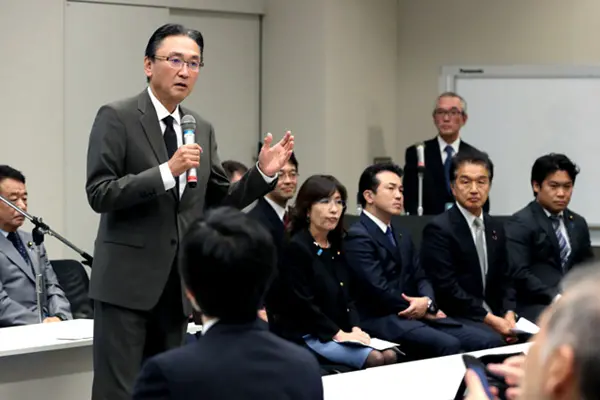More than 100 individuals gathered in the Diet on Nov. 1 seeking legal revisions to bring back a pre-World War II national holiday that marks the birthday of Emperor Meiji.
The meeting, attended by 140 people but only 14 lawmakers, was organized by Meiji-no-hi Suishin Kyogikai (Association to promote Meiji Day).
Emperor Meiji was born on Nov. 3, and before the war ended, his birthday was a national holiday.
But after the promulgation of the Constitution on Nov. 3, 1946, the date was designated Culture Day based on a law on legal holidays that went into effect in 1948.
The group’s goal is to revise the national holiday law by 2018, the 150th anniversary of the Meiji Restoration that ended the Edo Period (1603-1867). Members say U.S. occupation forces took away from Japan a holiday that celebrated an important period in the nation’s modernization.
The meeting on Nov. 1 was held to encourage Diet members to form a multipartisan group to push for the legal change.
However, all but two of the 14 lawmakers who showed up were members of the ruling Liberal Democratic Party. One Democratic Party lawmaker who attended the gathering was Eiichiro Washio.
The group handed about 638,000 signatures asking for a Meiji Day holiday to Keiji Furuya, chairman of the LDP’s Election Strategy Committee and a close ally of Prime Minister Shinzo Abe.
Furuya referred to the prewar holiday of Meiji-setsu established to honor the birthday of Emperor Meiji (1852-1912) and how it was drastically changed under directions from the Allied Occupation.
“We want to make the day into one in which all Japanese can reflect back and realize that it was the Meiji Era that was important,” Furuya said.
Defense Minister Tomomi Inada, another close Abe ally, said at the gathering: “The spirit of the Meiji Restoration was to return to the great achievements made by Emperor Jinmu and to promote reform while protecting the good traditions of Japan. We will put all our efforts together in order to bring back that spirit.”
Jinmu is the legendary first emperor of Japan, and the imperial line is believed to be descended from him.
Meiji-no-hi Suishin Kyogikai was established in 2011.
Tetsuo Ito, head of the Japan Policy Institute and a policy adviser to Abe, Yasuo Ohara, professor emeritus of religious studies at Kokugakuin University in Tokyo, and journalist Yoshiko Sakurai are among the executive members of the group.
During Diet deliberations before the 1948 passage of the national holiday law, Nov. 3 was chosen for Culture Day because “it was an important date on which we declared our intention to renounce war.”
The decision was made to call it Culture Day to promote culture while maintaining a love for freedom and peace.
A document put together by Meiji-no-hi Suishin Kyogikai has a completely different view.
“The legal holiday should be for remembering the Meiji period when nation-building was conducted with the people in unity with Emperor Meiji and as a way for transmitting to future generations the powerful course taken by the Japanese people as the nation of Japan modernized,” the document says.
Apart from the move to establish a Meiji Day holiday, the government announced plans in October to organize commemorative events to mark the 150th anniversary of the Meiji Restoration.
(THE ASAHI SHIMBUN)
 简体中文
简体中文

